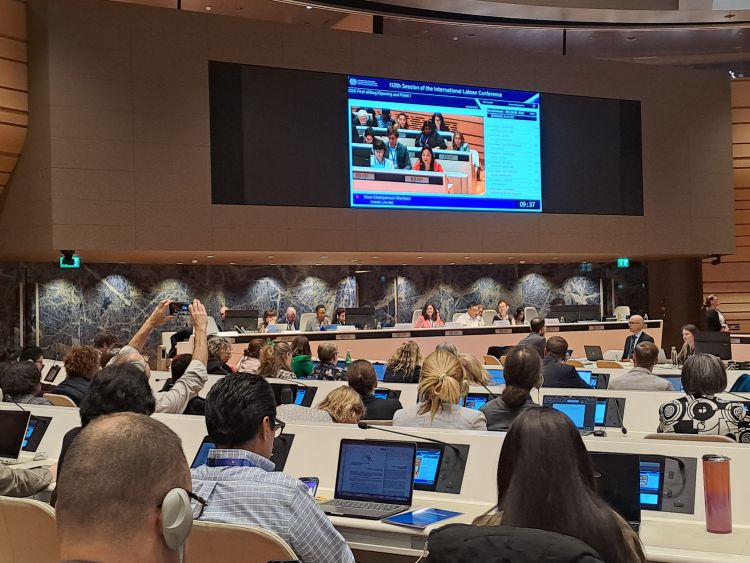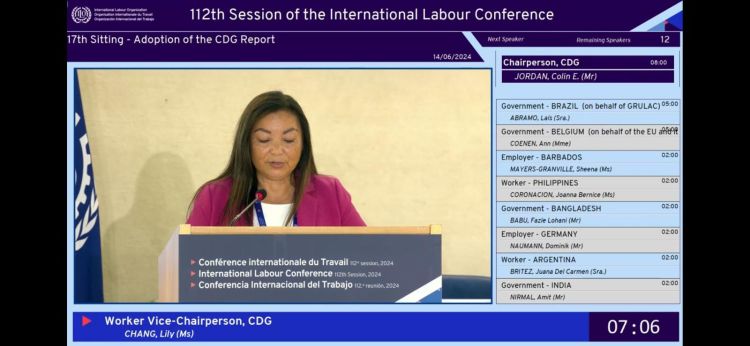A new global agreement on decent work in the care economy
Good news for the world’s 381 million care workers. For the first time ever a major global policy-making body has discussed labour conditions in care – and the measures needed to ensure quality employment for all of the care workforce.
The General Discussion on Decent Work in the Care Economy took place at the International Labour Conference (ILC). This annual tripartite meeting of workers, employers and governments hosted in Geneva by the International Labour Organisation, the UN agency promoting labour rights and social justice - and the only part of the UN system where workers’ and employers’ organisations get equal votes to their governments.

The discussion saw passionate – and at times heated – debate aimed at agreeing a common understanding of the care economy, which spans sectors such as social care, childcare and early years, education, health and social work. Priority policies and investments needed to make decent care work a reality worldwide were also considered.
TUC engagement
Ahead of the ILC the TUC worked with our affiliated unions to agree shared priorities for the discussion. These included securing government commitments to ensuring quality, sustainable and directly-provided public care services; fair pay and decent working conditions for all paid care workers, including migrant care workers; sectoral and workplace collective bargaining; training and skills development; and health, safety and wellbeing.
Abigail Hunt and Amanda Brown from the TUC delegation participated actively in the discussion, collaborating with workers’ group unions and the International Trade Union Confederation (ITUC) throughout to ensure our priorities featured strongly in the negotiations.

At the end of the two weeks – and following an exhausting stretch of late-night negotiations - a resolution and agreed conclusions were adopted by the Conference.
The agreement
The discussion outcome document established guiding principles for governments when pursuing care-related policies and other initiatives, including:
- The respect, promotion and realisation of fundamental principles and rights at work, including freedom of association and collective bargaining.
- Implementation of relevant international labour standards.
- Investment in the care economy as a key means of promoting quality care and decent job creation.
- The primary responsibility of the state in care provision, funding and regulation, including through a robust policy and regulatory framework.

The conclusions also call on Governments, employers’ and workers’ organisations to take specific actions, including to:
- Design and implement integrated care policies and systems for decent work and gender equality
- Mainstream care across public policy – including employment, skills, economy, social and labour protection, migration and environmental policies
- Prevent and address violence and discrimination against care workers, especially women, migrant workers and those from racialised groups.
- Ensure adequate minimum wages, whether statutory or negotiated.
Finally, the International Labour Office was tasked with developing and implementing a plan of action to guide the ILO’s work on decent work and the care economy in the coming years. This will include research on gaps and best practice in care policies and other initiatives; ramping up policy and technical support to further decent work in the care economy; and developing international statistical standards for paid and unpaid care work.
What is missing?
Despite these important wins several workers’ group demands did not make it into the final outcomes in the face of strong and coordinated opposition from employers and some governments.
Calls for recognition of care as a public good were not successful.
Neither did we win strong enough commitments to protections for migrant care workers. This is a critical gap, notably here in the UK given the critical role of international recruits in tackling the near-record high vacancy rate in social care and the prevalent exploitation of migrant workers in the sector.
And despite strong opposition from the global labour movement, an employer-backed call for private-public partnerships as a means of scaling-up care services was included in the final outcome document.
Next steps
The TUC will draw on this new international agreement in our work with the next UK government following the general election in a few weeks’ time. While the outcomes are not binding on governments or employers, this recent global tripartite consensus is a useful tool to reinforce our long-standing proposals around what is needed to make sure care work is decent work.
The Labour party’s manifesto commitments to establishing a collectively bargained Fair Pay Agreement in social care and National Care Service are important steps in the right direction. A top priority for us will be working alongside our affiliated unions and a future Labour government to turn these pledges into reality.
Unions, reps and members can also cite the agreement to bolster their asks of employers and policymakers across the care economy.
We will also look for opportunities to build on and strengthen the global care policy framework. And we will continue our work with the global labour movement to build worker power and secure decent work for all care workers.
Stay Updated
Want to hear about our latest news and blogs?
Sign up now to get it straight to your inbox
